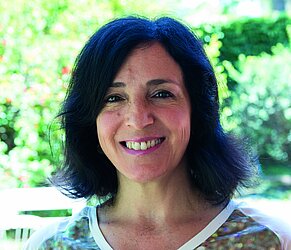Prof. Dr. Marta Inés Palacio, Argentina

1. Please describe your (scientific) work/research in a short way.
Marta Inés Palacio studied philosophy at the National University of Córdoba obtaining the degrees of Bachelor of Philosophy, Professor of Philosophy and Doctor of Philosophy (PhD). She is currently a Full Professor of the Chair of Scientific Research Methodology at the School of Languages at the National University of Córdoba (Argentina) and Senior Lecturer in the Chair of History of Contemporary Philosophy at the Faculties of Philosophy and Theology the Catholic University of Córdoba (Argentina). She is a visiting professor at several postgraduate courses at universities in the country and abroad.
Her theoretical interests and lines of research are broad and interdisciplinary. They cover interdisciplinary topics approached from a philosophical perspective. She is currently a member of the Organizing Committee of the Ibero-American Network for Research in Environmental Humanities, recognized by the Ibero-American Postgraduate University Association (AUIP), in coordination with researchers from 10 Ibero-American countries. Her academic work has been reflected in research projects, publications -scientific works, chapters and articles-, presentations at scientific events, which cover a thematic arc on issues of epistemology and research methodology, contemporary philosophy, cultural studies, feminist critical theory, more recently, environmental philosophy.
Their texts can be consulted at https://cordoba.academia.edu/MartaPalacio
2. Which aspect of a sustainable life, work and research is especially relevant for you and why?
From my work of philosophical research, I think that it is fundamental to rethink the ontological categories with which we have defined life and material beings. Carry out a critical review of the concepts of nature and humanity as opposed. From here, assume that a new ethical approach is necessary that rethinks human and non-human relationships and takes charge of the consequences of the responsibility we have in geohistory and in the accelerated and intensified process of climate change by atmospheric warming due to our actions. Also, that philosophical reflection contributes a critical and committed point of view to the political agendas of governments and states to stop and rectify the destructive direction of the world-environment.
3. What would be your wish for the future (and why) with this regard?
I wish critical consciousness to produce individual and collective changes regarding the destructive path that we have undertaken as a species on the environment since industrial and techno-scientific Modernity. I aspire to new relationships of care, respect and responsibility for every other being and entity, human and non-human, material, artificial, organic, and inorganic. I want new relationships of responsibility and care at all levels.
4. How is the Corona crisis affecting you in your every-day life and work?
Covid-19 has substantially transformed the individual and collective life of human beings in such a large dimension that we cannot yet calibrate. But we already warn that it is an event that has operated a decisive civilizational change in all societies on the planet simultaneously. Social rites, modes of economic and cultural exchange, human closeness have been transformed. The virtualization of existence and digitization have become the everyday eco-sphere of ways of life. Psychosocial illnesses, unemployment and poverty have risen. Latin American countries have been badly hit by Coronavirus infections, with a large number of deaths. Democratic governments have suspended constitutional guarantees under emergency and exception measures, increasing police and computer control over populations and groups. In this way, autocracies have been strengthened despite being in democratic systems, increasing the violation of human rights.
In my daily professional work, the pedagogical mode has changed since we teach through virtual classrooms with great didactic transformations. Academic contacts, exchanges of ideas and shared scientific projects have been reduced.



